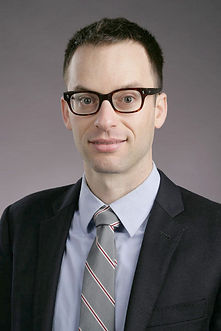
Before explaining one of his major political acts, an exhausting hunger strike at Wisconsin’s state capitol to protest tuition hikes, Jeffrey Broxmeyer remembered the origins of his interest in government, something that stands diametrically opposed to restricting food intake.
“My family would always talk [politics] at the dinner table,” Broxmeyer said.
Now, years after his act of starvation, Broxmeyer, educationally and nutritionally well-nourished, teaches American politics at the University of Toledo.
Sitting in his office with prepped interview notes on a small sheet of paper placed neatly in front of him, Broxmeyer reminisced on his collegiate years.
After finishing his undergraduate degree in political science at the University of Wisconsin-Madison, instead of a smooth transition into the next stage of life, Broxmeyer faced a lover’s dilemma.
His then-fiancée, now his wife and mother of his two-year-old child, wanted to go to law school, while Broxmeyer set his sights on a doctoral degree.
Deciding between L.A. and New York and factoring separation out of the equation, they picked the latter.
“She had a better deal out in the East Coast so it just kind of ended up working that way,” Broxmeyer said. “She went to the University of Pennsylvania, and I went to the City University of New York Graduate Center.”
And, what Broxmeyer now refers to as the act of a “trooper,” his wife traveled a few hours each day, sometimes waking up at five and returning at nine or ten at night.
The clichéd life of a struggling grad student trying to build a life with the woman of his dreams segued into his academic appointment of assistant professor at UT in 2015, allowing Broxmeyer to teach students in another format now—an interview for the campus newspaper.
He dove into the current state of American politics in the context of three current events.
The Doug Jones Upset in Alabama
Referring to the first bullet point on his piece of scratch paper, Broxmeyer made something clear: although Republicans control both the House and the Senate, the state of American politics isn’t going to stay in the red forever.
“People seem to think that there is no rebalancing going on in public opinion or the electorate,” Broxmeyer said. “[They see that] the Republican Party has unified national control.”
But he predicts the power will shift.
Democrat Doug Jones recently won a senate seat in Alabama, “one of the most conservative states in the country,” against Republican Roy Moore, suggesting a change in party dynamics.
Acknowledging “contributing factors”—Roy Moore’s ultra-conservative agenda and credible allegations he had sexually abused girls, one as young as 14—Broxmeyer still sees the election as “a data point” exemplifying a referendum on President Trump and the Republican Party.
And whether “that’s a harbinger of something to come” in the 2018 midterm elections, we’ll just have to wait and see.
The Mueller Indictments
In May 2017, Special Counsel Robert Mueller III started investigating Russia’s interference into the 2016 election and possible collusion with the Trump campaign.
Lately, “the special prosecutor really seems to be ratcheting up the intensity of that investigation,” Broxmeyer said.
“Mueller’s team has either indicted or gotten guilty pleas from 19 people and three companies so far,” according to VOX, a multinational digital news site.
“That group is composed of four former Trump advisors, 13 Russian nationals, three Russian companies, one California man, and one London-based lawyer,” Vox explained.
“The indictments and the way in which they keep rolling out in a really kind of consistent way suggest that it’s going to continue to be a big story,” Broxmeyer said. “We know that because there’s always a really strong reaction from the president every time those indictments roll out.”
One response emerged via Twitter on a recent Saturday night.
Trump, citing Fox News and placing blame on President Obama, wrote, “‘Russians had no compromising information on Donald Trump’ @FoxNews Of course not, because there is none, and never was. This whole Witch Hunt is an illegal disgrace…and Obama did nothing about Russia!”
Tweets like this are why, “it [is] virtually impossible for Republicans to advance much of an agenda…the president is so distracted.”
“Since the post-war period, the way in which the parties’ legislative agenda is organized is by whether or not the president is advancing something."
The Trump administration secured one major legislative victory since the November 2016 election, the Tax Cuts and Jobs Act, but it fell short on health care and immigration reform—two major campaign promises.
“Where is his program?” Broxmeyer asked. “He tweets about it, but that's a lot different than actually filling out and flushing out substance and saying, ‘First we’re gonna do this, and then we’re gonna do this, and then we’re gonna do that,’ and really the president has not been at the table.”
So, “It’s pretty much just been whatever [Speaker of the House] Paul Ryan and [Senate Majority Leader] leader [Mitch] McConnell decide that they wanna do.”
But, “The problem is that their members are in disagreement. They couldn’t even come to an agreement that seemed to be [of] consensus within the party, for instance, repealing the Affordable Care Act.”
America’s legislative agenda is “basically adrift, and [the] Muller [investigation] is a large part of that.”
The Corker and Romney Shift
Explaining what, to an outsider, might seem like an episode of a bad reality show, Broxmeyer recalled a moment from the “incredibly divisive” 2016 primary.
“Donald Trump said that Ted Cruz’s father killed Kennedy."
And at one point, Cruz called Trump a “sniveling coward.” “I mean that's the kind of stuff that was percolating in the primary,” Broxmeyer said.
Now, a little over a year into the presidency, Republicans, like Cruz, who were once Trump’s harshest critics, are supporting the president.
Sen. Bob Corker (R-TN), who at one point, announced he would not seek reelection and publicly criticized Trump, is backing down, jumping on board, and as CNN reported, “mulling over if he should reconsider leaving Congress.”
Even Mitt Romney, “a big critic during the 2016 election of Donald Trump’s rhetoric, of his policy positions and his demeanor,” is back stepping.
He gratefully accepted Trump’s endorsement of his bid for the Utah Senate seat.
Despite past fractures, the “Republican party really has unified behind Donald Trump. They may have some trouble finding a coherent program to move in terms of legislation in Congress, but you don’t really have these [critical] voices anymore.”
The “politics as usual:” a campaign season, coalition building and the way members of the same party work together to effectively govern explains repaired rifts.
But, “on the other hand, you don’t see the same degree of internal dissension.”
The Trump News Cycle
In early February, Josh Dawsey, the Washington Post’s White House correspondent, sent out a tweet organizing a string of current events.
“This week: spousal abuse, One week ago: the memo, two weeks ago: Trump moved to fire Mueller, against lawyer’s wishes, three weeks ago: [government] shutdown!, four weeks ago: ‘shithole’ and porn star payoff, five weeks ago: …Bannon excommunication…” Dawsey wrote.
Political news seems more like scandal sheet material because “Donald Trump really came of age in New York in the [70s and 80s] when he made a name for himself through the tabloids,” Broxmeyer explained.
His name in the press, “who he’s insulting, who he’s dating, the parties that he’s at,” is what took him “from a realtor developer to a brand name.”
Trump’s desire to see his name in the news followed him to the White House.
Now, the President is “twirling with his performances in a fairly consistent way even though the content changes. It’s scandal this, scandal that, controversy this, ‘these folks are losers,’ etcetera,”
As someone whose job it is to make sense of American government in a way his students can digest, Broxmeyer suggests that “if you want to cut through the noise…” pay attention to the doing, not the saying.
“Pay attention to the actors like Speaker of the House Paul Ryan, or [House Minority Leader] Nancy Pelosi...or even the department secretaries, as opposed to what Donald Trump is saying,” Broxmeyer said.
Before heading out of his office to go bowling with other professors and students, Broxmeyer ended on a lighter note, summarizing the state of American politics in two words, emulating a Simpson’s cartoon catchphrase: “Ha! Ha!”

